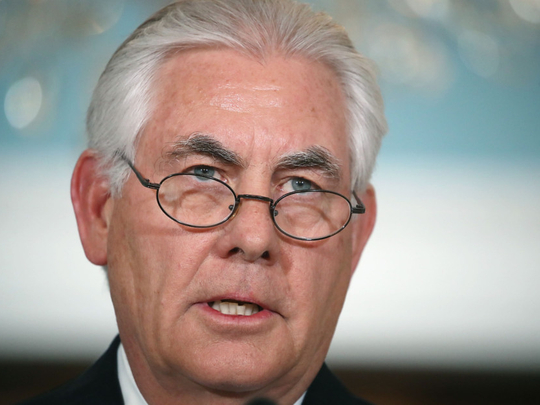
Washington: US Secretary of State Rex Tillerson on Wednesday accused Iran of ‘alarming ongoing provocations’ to destabilise countries in the Middle East as the Trump administration launched a review of its policy towards Tehran.
Tillerson told reporters the review, which he announced on Tuesday, would not only look at Tehran’s compliance with a 2015 nuclear deal but also its behavior in the region which he said undermined US interests in Syria, Iraq, Yemen and Lebanon In his remarks on Wednesday, Tillerson focused not only on the nuclear deal, but also on what he called Iran’s “alarming and ongoing provocations that export terror and violence.”
He specifically cited Iran’s support for Syrian President Bashar Al Assad and for Al Houthi rebels in Yemen, as well as hostility to Israel, the harassment of US naval vessels plying the Arabian Gulf and cyberattacks against the United States and its allies in the Gulf.
“Iran spends its treasure and time disrupting peace,” he said..
His tough words matched those of US Defence Secretary Jim Mattis, who said in a visit to Saudi Arabia on Wednesday that Iran’s destabilising influence would have to be overcome to end the conflict in Yemen.
President Donald Trump ordered the review to evaluate whether suspension of sanctions related to the nuclear deal was “vital to the national security interests of the United States,” Tillerson said.
Though there was no sign the Trump administration intended to walk away from the deal, Tillerson twice cautioned that if left unchecked Tehran could become a threat like North Korea, which is also under pressure over its nuclear ambitions.
In a letter to US House of Representatives Speaker Paul Ryan released late on Tuesday, Tillerson declared that Iran was meeting its commitments under the 2015 nuclear deal but there were concerns about Tehran’s role as a state sponsor of terrorism.
“A comprehensive Iran policy requires we address all of the threats posed by Iran and it is clear there are many,” Tillerson told reporters at the State Department.
Tillerson said the 2015 nuclear deal between Iran and six world powers failed “to achieve the objective of a non-nuclear Iran and only delays their goal of becoming a nuclear state.”
‘Failed approach’
Iran has yet to comment on the Trump administration’s review, but Iranian Supreme Leader Ayatollah Khamenei warned in November that Tehran would retaliate if the United States breached the nuclear agreement.
Tillerson said one of the mistakes in the way the agreement was put together was that it ignored all the other serious threats Iran posed outside of its nuclear programme.
“That is why we have to look at Iran in a very comprehensive way in terms of the threat it poses in all areas of the region and the world,” he added.
“This deal represents the same failed approach of the past that brought us to the current imminent threat we face from North Korea,” Tillerson said of the nuclear deal.
The nuclear agreement, negotiated during Barack Obama’s presidency, placed limitations on Iran’s nuclear programme in exchange for lifting economic sanctions against Iran.
Tillerson’s notice to Congress was part of a 90-day process in which the president has to certify that Iran is complying with the nuclear accord. It is the first update under the Trump administration.
The next test of Trump’s attitude toward the nuclear deal will be in May when he must decide whether to extend sanctions waivers for Iran first signed by President Barack Obama.
Congress has introduced bills extending US sanctions against Iran related to its alleged support of terrorism, human rights violations and missile tests. Lawmakers have put the legislation on pause, however, because of the impact the bills could have in Iran’s presidential election scheduled for next month. President Hassan Rouhani, a relative ‘moderate’ who pressed for the deal against domestic opposition, is seeking reelection. In addition, the US treasury has announced sanctions against individuals and companies affiliated with Iran’s Islamic Revolutionary Guard Corps.
During his presidential campaign, Trump called the agreement “the worst deal ever negotiated” and said he would review it once he reached office.
The European Union’s foreign policy chief, Frederica Mogherini, said last month after meetings with senior Trump administration officials she was reassured in the talks that the US was committed to fully implementing the deal.
Nuclear deal terms:
The historic agreement was negotiated with Iran by the United States, Britain, France, China, Russia and Germany, with help from the European Union. It did not address Iran’s support for terrorism or dismal human rights record, but focused on its commitment not to build a nuclear weapon for at least a decade and to open its facilities to UN inspections.
In exchange, international and US sanctions on nuclear-related issues were lifted and billions of dollars in Iranian assets were unfrozen when the deal was implemented in January 2016. With Iran getting most of its benefits up front, even critics of the agreement have said the United States gains little by breaking the deal now. Iran has complained that sanctions relief never gave it the economic boost it craved, and it has blamed the United States for not doing enough to allow US businesses and banks to set up shop in Iran.












